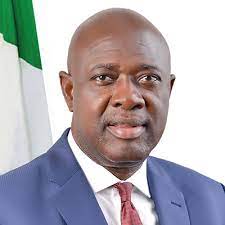
Boost Oil Output by 2026, FG Tells NNPC
The Federal Government has directed the management of Nigerian National Petroleum Company Ltd. (NNPC) to increase oil production beyond current levels by the end of the year.
The Minister of State for Petroleum Resources (Oil), Heineken Lokpobiri, who said this in an interview on the sidelines at the Africa Energy Forum (AEF) in Houston, Texas, U.S, emphasised the need for accelerated growth in the nation’s oil output.
The forum, organised by ACME Multech Services Nigeria, has the theme “Africa’s Energy Investment Drive Amid Global Transition to Green Minerals and Clean Energy”.
The minister said though President Bola Tinubu had initially tasked the NNPCL with ramping up production to two million barrels per day (bpd), but later increased the target to 2.5 million bpd.
“When the new NNPC management visited me, I raised their production target from the President’s initial goal of two million bpd to 2.5 million bpd,” he said.
Lokpobiri expressed optimism that the revised target was achievable, citing past production levels during the COVID-19 pandemic, when output reached 2.5 million bpd in spite of minimal investment.
”The 2.5 million bpd target is realistic because the government is addressing the key bottlenecks that have hindered oil production,” he noted.
He highlighted that for over a decade, the oil and gas sector had seen little to no new investment.
According to him, recent reforms by Tinubu are reversing that trend, adding that ongoing efforts to combat pipeline vandalism and oil theft are beginning to yield results.
The minister said when he assumed office, Nigeria was producing around one million bpd, but the figure has risen to 1.8 million bpd.
Lokpobiri explained that the full implementation of the “Drill or Drop” policy under the Petroleum Industry Act (PIA), which mandates that for every quantity of oil extracted, allows new drilling be carried out to replenish reserves through seismic activity.
On the issue of international support for fossil fuel development, he remarked that the World Bank had stopped funding fossil fuel projects.
He clarified that NNPC had not received funding from the institution but instead partnered with international oil companies (IOCs) to source financing through alternative channels.
He criticised Western narratives calling for a halt to fossil fuel production, labeling them geopolitical in nature.
”The COP agreements advocate emission reductions, not an outright end to oil production.
Also speaking at the forum, Mrs. Jumoke Oyedun, Managing Director of ACME Multech Services Nigeria, said the 2025 Africa Energy Forum provides a crucial platform for evaluating Africa’s oil and gas exploration landscape.
Oyedun said that the forum was designed to explore both funding opportunities and investment prospects across existing and emerging energy sources, while aaddressing sector-specific challenges.
“It also emphasises the growing importance of regulation and the role of African oil companies in harnessing the continent’s hydrocarbon resources,” she said.
Oyedun added that the AEF 2025 would highlight the ongoing energy transition and explore its potential impact on Africa’s oil and gas sector, particularly amid the rising global demand for green minerals and renewable energy solutions.
According to Oyedun, the panel discussions will examine how African policymakers can attract significant investment, especially in light of anticipated shifts in U.S. energy policy following the 2025 elections.
The forum was attended by delegations from petroleum ministries of Nigeria, Togo, Senegal, Algeria, Ghana, Liberia, and The Gambia.
